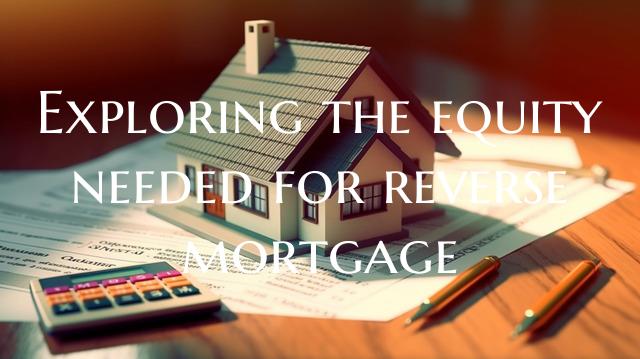Exploring the equity needed for reverse mortgage

Introduction: Reverse mortgages have become a popular financial tool for retirees looking to tap into their home equity without having to sell their property. One key factor that determines eligibility for a reverse mortgage is the amount of equity a homeowner possesses in their property. Understanding the equity needed for a reverse mortgage is crucial for individuals considering this option as part of their retirement planning strategy.
What is a Reverse Mortgage? A reverse mortgage is a type of loan available to homeowners aged 62 and older that allows them to convert part of their home equity into cash. Unlike a traditional mortgage where the homeowner makes monthly payments to the lender, with a reverse mortgage, the lender makes payments to the homeowner. The loan is typically repaid when the homeowner moves out of the property, sells the home, or passes away.
Equity Requirements for a Reverse Mortgage: The amount of equity needed for a reverse mortgage is determined by several factors, including the age of the youngest borrower, the appraised value of the property, and current interest rates. Generally, the more equity a homeowner has in their property, the more funds they can potentially access through a reverse mortgage.
Lenders typically use a formula to calculate the maximum amount of funds a homeowner can receive based on their age and the appraised value of the property. The homeowner must have sufficient equity in the home to cover any existing mortgage balance, closing costs, and the initial draw of funds from the reverse mortgage.
Benefits of a Reverse Mortgage: For retirees on a fixed income, a reverse mortgage can provide a valuable source of additional funds to supplement Social Security, pensions, and other retirement savings. By tapping into their home equity, homeowners can access cash for large expenses, healthcare costs, home renovations, or simply to enhance their quality of life in retirement.
Conclusion: Understanding the equity requirements for a reverse mortgage is essential for homeowners considering this financial option as part of their retirement planning. By assessing their property's value, current mortgage balance, and financial goals, individuals can determine whether a reverse mortgage is a suitable choice for unlocking their home equity in retirement. Consulting with a financial advisor or reverse mortgage specialist can provide personalized guidance on how to leverage home equity effectively through a reverse mortgage.
